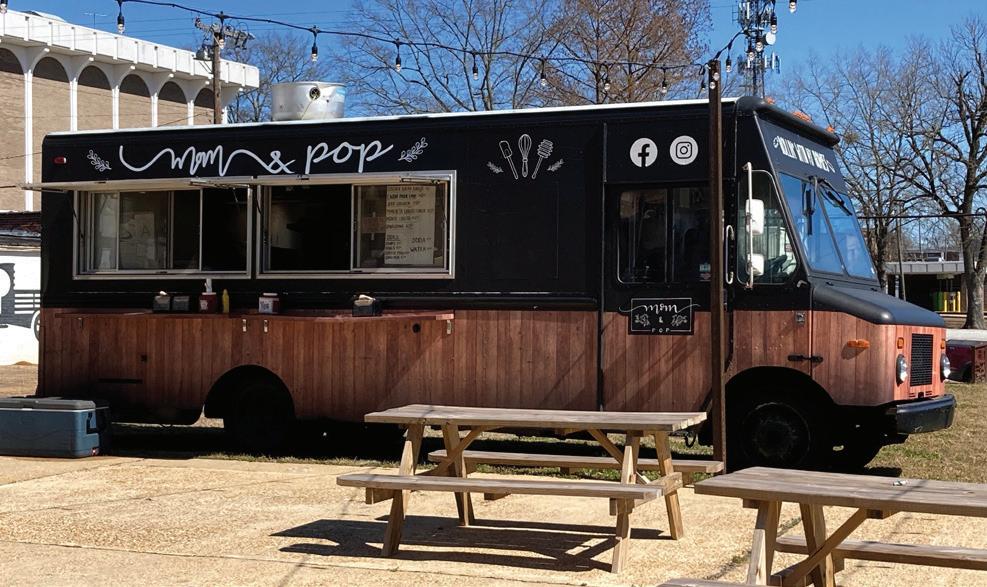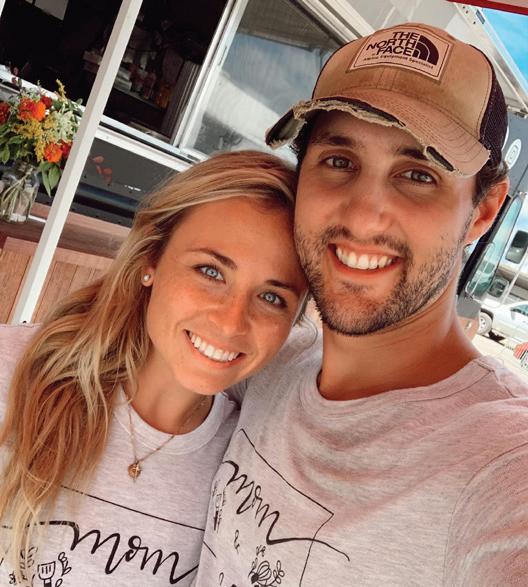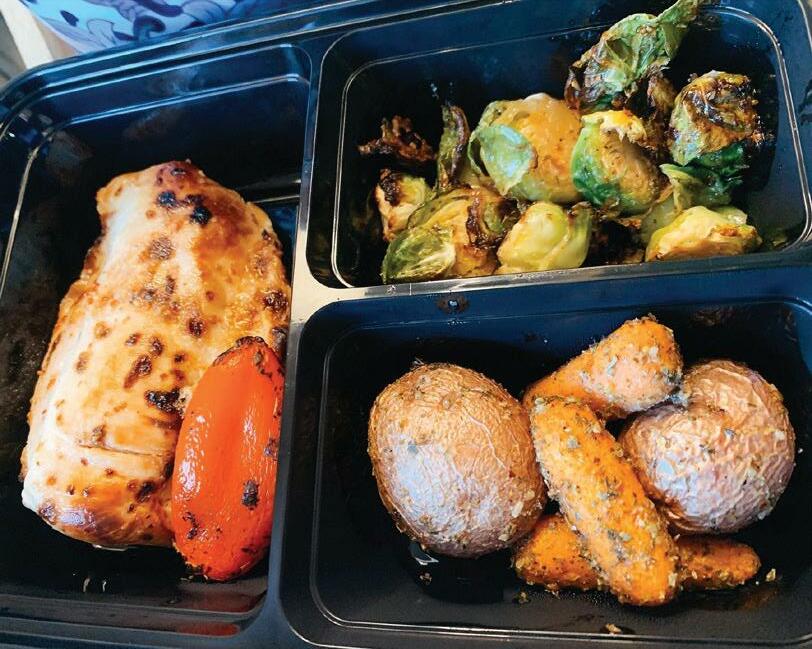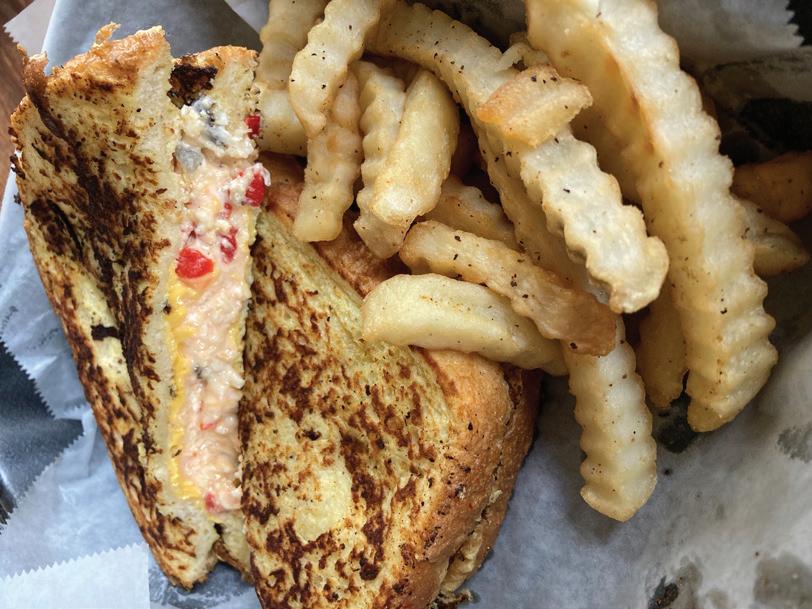
8 minute read
MOM & POP FOOD TRUCK Locally Made and Locally Loved
BY JAY REED
Food trucks have been a fascination for some time now, maybe even longer than many realize. It’s only been a year or so since the Oscar Mayer Wienermobile made its way to Starkville, but the iconic (and literal) hot dog truck has been around since the mid-1930s. Today, it’s more marketing than cooking, but it’s still on the road. (And if now you can’t get “I’d love to be an Oscar Mayer Wiener” to stop playing in your head, you’re welcome.) Jump forward a couple of decades, and perhaps a different sing-song tune is playing, announcing the ice cream truck rolling through your neighborhood. But food trucks, as we think of them today, have a little more recent history.
Advertisement
There were King Taco trucks in Los Angeles as early as the 1970s, but 2008 was the year Roy Choi opened up the Kogi Korean BBQ truck. Since then, it’s been uphill… and downhill… and any direction a truck can go, as the food truck revolution continues to grow. Food Network lists at least six different shows about food trucks. I’ve personally attended two Food Truck Mash-Ups in Jackson. Food trucks aren’t going anywhere, or should we say they’re going everywhere? Food trucks are definitely trending.
Bigger cities tend to see trends like these first. But in recent days, food trucks have gained a foothold in some of the smaller towns of Mississippi. Pontotoc has Tanglewood Food Truck Park, and Starkville hosts a park on the former site of its farmers’ market. A few years ago, it was hard to find a truck when you wanted one (dare I say needed?), but now, on most days, we’ve got choices.
In the Starkville area, one of the trucks that has led the way in longevity and creativity is the Mom and Pop truck. It rolled into town in late March of 2020 with Chef Hunter Bell at the wheel, his wife Hannah riding shotgun. Originally a delivery van in California, it went all the way to Washington, D.C., to a company that built it out and painted it according to the Bells’ specifications, then it was picked up and driven to Mississippi. But the journey for the Mom and Pop business started long before that.
Hunter and Hannah both attended The W in Columbus, where Hunter got a culinary management degree. Ironically, they never met on campus; both lived in Starkville and connected by way of another local restaurant. Once married, they decided to stay in Starkville and open their own business. A food truck wasn’t necessarily the end goal, but after a brief foray into that world, it seemed like a solid stepping stone into the growing culinary scene.
Before launching the truck, Hunter said, they had to find a base location, aka a “commissary.” This is common to all food trucks: everybody has to have a place to store food and supplies, clean the dishes, etc. But unless a truck already has a “brick-and-mortar” restaurant, the commissary is often behind the scenes. Customers see on social media where a truck will be parked and serving day to day, or perhaps get lucky enough to happen upon it while driving by, but after the windows are closed and it drives away, who knows where it goes?
With Mom and Pop, however, the base location was announced before the truck ever hit the road: the former location of The Biscuit Shop on Washington Street, just a half block down from Main Street. (One purveyor of comfort food made way for another, it seems.)
Despite the fact that they have a home base, it’s still a food truck life. Restaurants without tires tend to have a more regular schedule—certain days at certain times. Prep, serve, clean up, go home, repeat. When asked what a typical “day in the life” of a food truck looks like, Hunter said—not surprisingly—that there really is no typical day.
That may be because they have a lot of irons in the cooking fire. Of course, the truck is the focus at the moment or at least the most visible to the hungry public. From it, they can serve quick meals from a parking space on the side of the street, or it may work as a vessel for catering, whether they serve from the truck itself or use it primarily to transport the food. The outer decor of the truck was actually designed with events in mind, and in a strange twist, the pandemic has helped pave the way for food trucks to be featured at wedding receptions and the like. As the time has passed and they’ve




put a few more miles in the business and, as the world has evolved again and again, they’ve continued to pivot and explore options.
In hindsight, the general public might look at the early months of 2020 and say, “Maybe this isn’t the best time to open a restaurant.” In fact, many restaurants across the country closed during that time, and some never reopened. For the Mom and Pop food truck, however, it was an opportunity to serve the community. Tired of cooking at home under quarantine or during those initial curve-flattening weeks? Mom and Pop would come to you. In those earlier days, both the schedule and the menu made a pivot. Instead of the breakfast and lunch wraps and sandwiches that would later become menu staples, the Bells and their crew turned to casseroles and quiches and took the truck to the neighborhoods of Starkville. And though they may not have had the traditional ice cream truck music blaring from a speaker, they did serve ice cream from the truck during that season.
The need to be flexible actually played into the business name. They wanted a mom-and-pop business: locally based, locally supported and with local partnerships. But they didn’t want to be locked into a particular menu. BBQ trucks sell BBQ; taco trucks sell tacos. A mom-and-pop truck could feed whatever the need might be and would allow Hunter’s culinary creativity to have a home. Coincidence or not, they were also new parents. The name Mom and Pop checked all the boxes.
Once the world began to normalize a little, the truck shifted back into the traditional mode of lunch stops around Starkville and visits to other local towns in the area, like Grenada, Hunter’s hometown. They can also be found working festivals or feeding firemen. Hungry students might find them parked in the Cotton District on weekend late nights. Their Instagram account is evidence of all the weddings they’ve been invited to cater. Again, no typical day… or night.
Unlike most restaurants, the usual front-of-house (hosting and serving) and back-of-house (cooking and office) division of labor is a little less black and white. Whoever is on the truck may be cooking, taking orders, checking out customers, and probably taking social media pics of the truck, the menu of the day and some of the food. Hunter is the chef and… chief mechanic? He said, “With a truck… if it can go wrong, it will. I was not expecting to be a diesel mechanic when I started this.” If the truck isn’t running, the core of the business isn’t running. Commitments are made, and the truck is literally the vehicle that gets them there. It has to be gassed up for travel and for cooking. So far, still not typical. But just because he’s acquired mad mechanical skills doesn’t mean he’s left the culinary side behind. “I think of stuff all the time,” he says, and the menu development over the last couple of years has shown that. The Bells liked the wraps at City Bagel, and when it closed, they realized there was still a niche for that kind of lunch/breakfast item. Some of Hunter’s favorite ingredients and concepts have resonated with the locals and are staples on the truck and in the shop. The Chicken Bacon Ranch is one of their signature wraps, along with the Jerk Chicken wrap, with pineapple, pepper jack cheese and chipotle mayo. Hunter is also a fan of the Monte Cristo sandwich: ham and three cheeses, grilled like French toast, served with powdered sugar and seasonal jelly. There was no one else around town serving it at the time, and it has become a crowd favorite.
These days, in the shop, you’ll find individual meal preps in the cooler which can be purchased for lunch the next day or the next week. You might also be able to grab a container of soup (and remember, they won a soup award!) There’s a fridge/freezer in the corner which has casseroles and similar “take and bakes,” which make feeding the family a little easier. The shop also has a case often stocked with baked sweet treats, especially around holidays.
From day to day, the menu may vary on the truck or in the shop, but that’s the novelty of a food truck. Late-night items might be moved to lunch (hello, Dawg Bowl). King cakes appear in the weeks before Mardi Gras. Chocolatecovered strawberries welcome Valentine’s Day. Thanksgiving brings all the traditional sides. They even had tacos once.
A day in the life of a food truck, as it turns out, is only typical in that it’s not typical. But that’s okay with the folks in Starkville and surrounding areas. They are glad to be home base for Mom and Pop. Ultimately, they are the folks for whom the Bells roll.
Learn more at facebook.com/starkvillemomandpop, @ mom_andpop on Instagram or by calling 662-809-3264. edm











